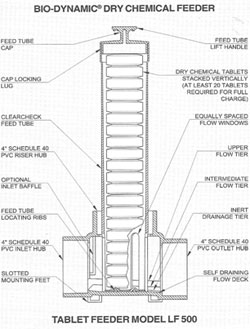Difference between revisions of "How to Purify Water with Chlorine Tablets"
Alessandro (talk | contribs) |
Alessandro (talk | contribs) |
||
| (4 intermediate revisions by 2 users not shown) | |||
| Line 16: | Line 16: | ||
Most of our 100 installations in the capital are LF500 devices shown in this illustration. A few are much larger such as our chlorinator in Jalousie which serves 50,000 people. The devices cost $40 and $100 depending on their size and come from the NORWECO Company in Ohio. Tablets cost $50 a year in the smaller chlorinators from Arch Chemicals. | Most of our 100 installations in the capital are LF500 devices shown in this illustration. A few are much larger such as our chlorinator in Jalousie which serves 50,000 people. The devices cost $40 and $100 depending on their size and come from the NORWECO Company in Ohio. Tablets cost $50 a year in the smaller chlorinators from Arch Chemicals. | ||
| − | International Action. Copyright 2008 | + | International Action. Copyright 2008<br> |
| − | www.haitiwater.org | + | www.haitiwater.org<br> |
info@haitiwater.org | info@haitiwater.org | ||
| + | |||
| + | ==Categories== | ||
| + | |||
| + | [[Category:Global Technology]] [[Category:Products]] [[Category:Water]] [[Category:Ideas]] [[Category:Community]] | ||
| + | [[Category:Requested translation to Spanish]] [[Category:Requested translation to French]] | ||
Latest revision as of 17:53, 8 December 2009
Tablet Chlorinators Stop Waterborne Disease in Haiti
Holding as many as twenty four-inch tablets of chlorine, the chlorinators we use in Port-au-Prince can treat 5000 gallons of water each day. Most of our sites serve up to 10,000 Haitians by providing water to family members who stand in line with 5-gallon plastic buckets. When full, each bucket weighs forty pounds, a heavy burden for a child who totes one.
Each Chlorinator treats 10% of the water going into the local tank by running it through the tablet chamber. That process puts enough chlorine into the water to treat the entire tank contents. We provide test kits with color-coded guides to measure the chlorine content regularly. Each device has a handle to change the flow and regulate chlorine levels.
The device has no moving parts and uses no electricity which makes the chlorinators appropriate for Haiti and other developing countries, where there is no electric source or it is undependable. In Port-au-Prince, the electricity is off for days at a time, and often on for only three or four hours.
Most of our 100 installations in the capital are LF500 devices shown in this illustration. A few are much larger such as our chlorinator in Jalousie which serves 50,000 people. The devices cost $40 and $100 depending on their size and come from the NORWECO Company in Ohio. Tablets cost $50 a year in the smaller chlorinators from Arch Chemicals.
International Action. Copyright 2008
www.haitiwater.org
info@haitiwater.org
